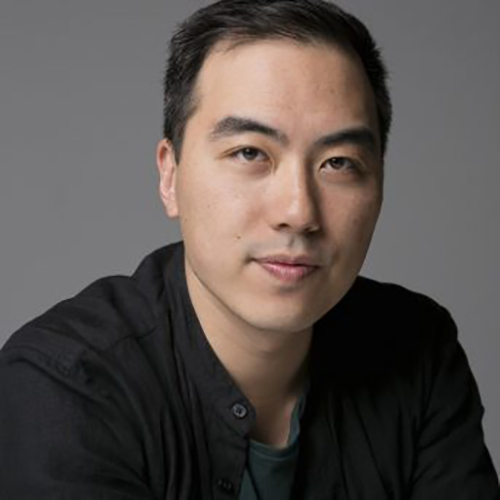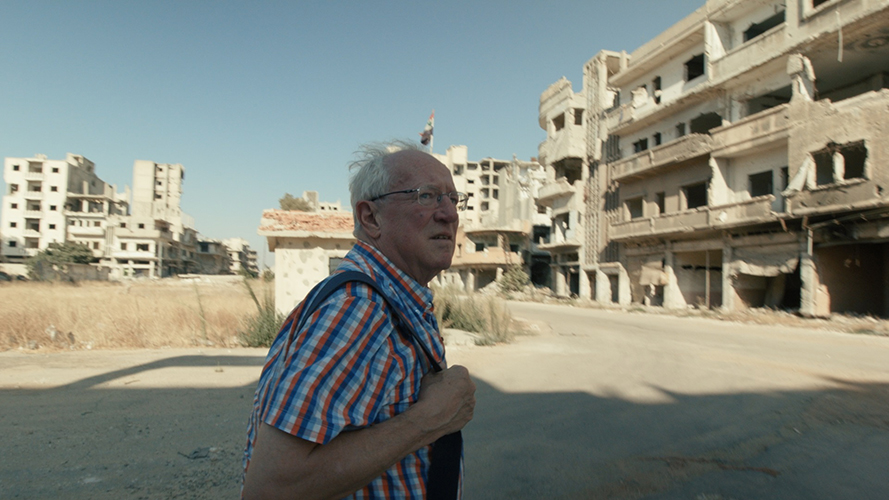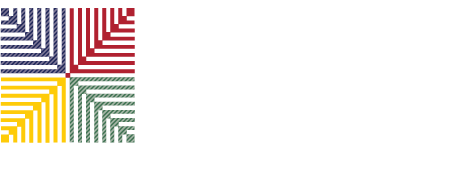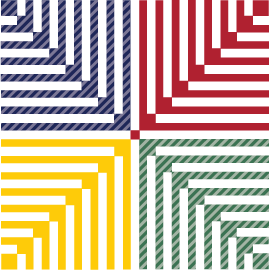

This is Not a Movie, a documentary film by Yung Chang, follows the legendary intrepid reporter Robert Fisk as he navigates war zones, editors, and public opinion. Fisk, who has been based in Beirut as the Middle East correspondent for The Independent for more than 40 years, has reported on every major conflict in the region during that time, from the Lebanese Civil War to the current conflict in Syria.
We spoke with Chang about his approach to the filmmaking process and how Fisk’s style of reporting, which often challenges official government narratives, was influenced by a great sense of history and being witness to horrific events such as the 1982 Sabra and Shatila massacre in Lebanon.


BPFF: How did you get into filmmaking?
YC: I’ve been at this for many years now, since I was a kid. My father used to rent Super8 reels from the public library where I grew up in Ontario, Canada. He would screen them for my brother and me in the basement. That’s how my interest started. I went to film School in Montreal at Concordia University, where I studied Film Production. I graduated in 1999 and have been working in the business since then.
Things really kicked off in 2007 with my first feature documentary, which was called Up the Yangtze. That began my career as a more full-fledged filmmaker. I became a little more rounded out in terms of how I thought about filmmaking. It doesn’t come very quickly, finding your approach to filmmaking. It takes a while to carve out a sensibility for the craft and for the voice that you want.
BPFF: How did you arrive at the idea for this film?
YC: I knew about Robert Fisk’s work—I had read it back in the post 9/11 era, where I would get on Znet and find stories and articles by all those writers and thinkers like Naomi Klein and Noam Chomsky. And it hit a chord with me—Roberts Fisk’s work as well. I felt like I was reading something that just seemed so obvious. It was great to see it clarified in such succinct terms, and I wasn’t really getting that perspective from the mainstream media. The mainstream media fed the current affairs aspect, but it never dove deeper than that. I wanted to find that, and I found that through Fisk’s work.
Then it was just a weird combination of events that led me to him and to make this film. The first thing was that I was in Vermont covering the 2016 US elections when Trump won. I was following this off-the-grid leftist, socialist farmer. It was part of this anthology film called 11-8-16, a documentary film where a bunch of filmmakers were sent around the country to cover a snapshot of different people during the 24 hours of the ramp up to the election. I covered this guy named Boots Wardinski. At 9:00 pm, he said, “This election’s done; Clinton’s won. I don’t like her. I don’t like Trump. I don’t care.” And he shut everything down and we went to sleep.
I woke up the next morning to a flurry of messages from my wife, who’s an American from Minneapolis, and she’s freaking out. She was about nine months pregnant, and I thought she was in early labor. It was a very traumatic experience, and the takeaway was like, oh man, we really missed the mark—or at least I did in terms of how I was reading and engaging with information at the time. I thought, “I wish there was a better way to do this.” I felt like the ground underneath me was caving in as I thought about my then-unborn daughter and her future, and I got very worried.
A couple of weeks later, I got a call from the National Film Board of Canada. It was from the producers, Anita Lee and Nelofer Pazira. They said, “Hey, are you up for a film about Robert Fisk?” I did a double take and replied, “The Robert Fisk? I need to make sure you’re talking about the journalist, right?” I took it as serendipity and decided to go visit Fisk in Beirut.
I spent about a week there with him. It was then that I realized okay, this could be a film. He’s interesting. Not only that—he’s not intimidating. He’s very charming and quite funny. He’s British, with that British charm that comes through. What I wanted to do with the film, which wasn’t clear until later when I worked with my editor, was that there was this seamlessness between past and present that had to come through in the film because that is how Robert thinks. He thinks through history, as a seamless thread. That was my takeaway from my experience with him, the fact that history can teach us a lot, and we have to learn from it.
BPFF: One of the things that comes through in a lot of Fisk’s writing is that he often talks about his relationship with his father, and this is something you explore in the film. It seems to have informed so much of his work as a reporter.
YC: There’s so much more to unpack there in terms of Robert Fisk the character, and I think so much of his upbringing and his awareness of history and his acclivity towards storytelling and journalism are related to his relationship with his parents, and that relationship was not so cut and dry. His father was definitely an influence—directly because of his connection to the Great War and how rare it is for Robert Fisk, who I think is 75, to have a father who fought in World War I. As you see in the movie, his father made him who he is in terms of his awareness of World War events. I think then Robert was able to think through that and its place in history and his relationship with his father.
It’s not clear in the movie, but if you’ve read his work, such as the book The Great War for Civilisation: The Conquest of the Middle East, he had a complicated relationship with his father later in life. It all came out that his father was a horrible racist. Robert had a lot of trouble with his father later in life, but I think when I was getting to the core of who he is in the movie, it wasn’t really about that turmoil that Robert had later with his father. That didn’t speak to the truth of what I felt was his relationship with his father—it was more about the influence he had in his early childhood. Clearly, there was a line through that and a respect that Robert had for his father for particular moments of his father’s life that really struck him, and I think informed his personality.
BPFF: Alongside his relationship with his father, you also describe his early years reporting in Northern Ireland and then moving on to the Middle East. We begin to see this pattern begin where he always wants to tell stories about the people who are suffering most.
YC: His love of storytelling and his definition of Journalism as reporting on the side of those who suffer in order to challenge authority came together for him very early on in his career as a journalist. It started to come together when he was covering the Troubles in Northern Ireland, and it culminated with his experience witnessing the Sabra and Shatila massacre in Lebanon in 1982. These events jolted him and created an anger in him that is present to this very day.
His moral integrity was sharpened as a result of his witnessing the negative influences of authority on everyday people. I think that is the driving force in his journalism, that moral integrity. You see it in the movie. We talk about how it gets him into a lot of trouble as a result. His integrity is so unwavering that you know, when you search him online, there’s all sorts of stuff that comes up about him, but he doesn’t indulge in that discussion. Whereas if you look at his career as a whole and you look at his cannon, you see this kind of refreshing perspective, and that is because he’s just so focused on that definition of journalism, which is the foundation of his integrity.
BPFF: It seems very much like he does not let that sort of criticism bother him, as he said in the movie—he’s been criticized for 40 years or more, and he’s used to it.
YC: When I was making the film, I broached the subject with him constantly, but he wouldn’t bend; he doesn’t care about that stuff and won’t indulge in it. Later, I felt that kind of makes sense. I liken it to not getting caught up in becoming a troll online, getting into those debates that don’t seem to lead anywhere. They’re just echo chambers, and he has understood that, in his analog way—because he’s very much analog—he will not go on the internet. That’s how he’s able to just keep going—by not wallowing in the criticism and letting history speak for itself.
The Douma gas attack of 2018 was one our bigger sequences in the film, because we were with him following that. If you look at that attack, he went to Douma and he was very early on one of the naysayers who came out questioning the report from the Organization for the Prohibition of Chemical Weapons (OPCW). Now I’m seeing the updates currently, and the former OPCW director has gone on the record to say how there was a sort of corruption in their reporting, and it was directly as a result of US and foreign influence. So in a way, Fisk was kind of right on that one. I questioned him, as did the BBC and other news organizations, and he really got into a lot of heat for that. I think the record stands, and history will tell the truth.
BPFF: There are several scenes in the film, including the aftermath of Douma attack, where we see this on the ground—the type of investigative reporting for which he is so famous. One particular scene in the film really illustrates that—where he found those weapons documents in a basement in Idlib, and he decides to go to Bosnia to track down this hunch.
YC: Fisk is in a very privileged position. He’s got a great relationship with the British newspaper The Independent, which has supported him over the years. He’s not making this six-figure salary. He’s still just the lowly reporter. But he does have that privilege of being able to say, I’m going to Bosnia to track this through. It’s a story that follows the origins of arms manuals that he found in Idlib, Syria. I mentioned trolling earlier—I guess his trolling is the sort where he’s looking at the debris of war-torn Syria and finding things. And in the debris on the rebel side, he found these arms documents. He has a hypothesis that these arms found their way into Syria on the rebel side as a result of the support of the Saudi Arabian government. So he went and he tracked it down. It was pretty dodgy and nerve-wracking to be with him on that experience. This type of reporting is dangerous, so we had to be very careful. For me, it was an important sequence to reveal his process. He’s an old-school journalist—that is, more like the detective who is sniffing out a theory and then going after it. Some of the stories he goes after don’t always work out, but this one did.
I think it begins a series of sequences in our film that dig deeper and deeper into the core of his beliefs, and we trace it all the way back to his father, and then we come back out into how media uses semantics and warps language to dull it down. To me that was a very powerful discovery—to find that out from the material.
This film very much emerged organically. There was no structure for the film. We knew we had some present-day filmmaking with Robert investigating, but we also had all this archive footage, and Robert’s own personal archive, and then archives that we found of Robert in films that he had been involved with in the past. The film is also built around themes. I felt like we were harnessing and muscling our way through the material that we had, as well as the 14-hour interview that Robert gave us. We were able to use that material and carve the story out of it. I give a lot of credit to my editor Mike Munn, for finding that path in the movie.
One of our great challenges was that we knew it couldn’t be a film about the history of the Middle East. That would have been impossible. Also, it was the fact that it was a film about a British journalist, a foreign correspondent who lives in Beirut telling his version of history. I wanted to make that clear as well—that this film is about perspectives and about personal truths and beliefs. I wanted to leave that open to a kind of a discussion for audiences to decide what they take away from the movie. I didn’t want the film to be a platform for Robert Fisk, because I knew that we would be challenged on that, but I did want to allow Robert to make his argument, and I think he does this persuasively. I hope that audiences are persuaded by his words, because I believe in most of them as well.
BPFF: This being the Boston Palestine Film Festival, we’d be remiss if we didn’t bring up Palestine. Fisk, perhaps more than any other journalist in the last 40-50 years, has consistently told Palestinian stories in his reporting, challenging the “official record.” In the film, he talks about being in battles with gunmen and battles with editors, the struggle to get the truth into print. Why do you think the Palestinian story has struck such a chord with him?
YC: I think his sadness and anger around the wrongs done to Palestinians is his greatest disappointment and his greatest frustration. The story is built around this journalist, who from early on his career was very idealistic, to his career now, in which he is quite jaded. He’s just so frustrated—why couldn’t his reporting and those of other reporters reveal to the world how wrong things are in Palestine? To be with him there in Ramallah in the West Bank, where we go and meet with Amira Hass, to see and witness the problems there—it’s so upsetting. I think he’s always been very struck by that suffering.
There was a scene in the film where that we cut, he wrote about it in an article for the Independent, but he goes to visit this antique collector in one of the refugee camps in Lebanon. This place is kind of a record of all the history of collected keys to houses in Palestine. At the end, the owner of the place asks him, “Are you Pro-Palestinian?” This is similar to the Israeli who asks him if he is pro-Israel in the film. Robert tells the man he is “pro ruth.” I think that is very clear. He is on the side of those who suffer. So I think that has greatly shaped his career and the way he thinks.
BPFF: At the end of the film, he is jaded and frustrated that policy maybe has not shifted as it should have and that challenging the record seems to be perhaps more difficult than ever, but he still has this driving passion.
YC: We wanted to make sure we wrapped on a note that was not too pessimistic—the idea that there are younger journalists taking up the mantle. He’s not the only one obviously, but he’s one of the rare, I would say, dinosaurs of this type of reporting. I think the optimistic note that to me was quite moving was the idea that his work can just leave a record of the events so that nobody can question if something did or didn’t happen. That is invaluable. We see that with Douma, and we see that with countless other stories that Robert’s covered. I think that’s what we need, certainly now more than ever, especially in the US where truth has been nuked. That’s why the history of the record is important and at some point, hopefully people will just come out of it and see the evidence of why we are where we are. I think Fisk is conscious and aware of that, and so he’s doggedly just keeping at those stories. He’s continuing to cover Syria. He’s continuing to remind us that even in the midst of a pandemic, there are wars happening and innocent people are dying.
BPFF: Could you tell us about the filming process?
YC: We filmed for a couple of years beginning in 2017 and through 2018. For me, the challenge was being able to let go of the sense of trying to create a narrative thru-line structure to the film. I was encouraged by my producers, gratefully, to just shoot and film and see where it took me, which is the first time I’ve ever done that. I was in the editing room with my editor, Mike Munn, a great editor who has cut great films that I love, such as Stories We Tell by Sarah Polley and Picture of Light by Peter Mettler. Mike took a couple of hundred hours of material and whittled it down to workable scenes and sequences. And then it was just organically feeling our way through it. We knew that we wanted to go through the past and the present. I think we achieved a nonlinear structure to the film that is muscled by theme and by the material that we had at hand. The best example of the structure for the movie, which I hope comes through, is the opening sequence where we are in the past with our piece of archival recording and video cut with current footage of Homs, Syria.
There’s a good little anecdote there. I had access to Robert Fisk’s archives, part of which was all of his cassette tape recordings. He keeps everything. So I was listening through these recordings, and I found this particular one during the Iran-Iraq war, during the 1980 siege of Abadan. Robert’s just running through bombs and trying to stay alive. It’s quite an energetic and harrowing kind of opening. I had the cassette material, but I didn’t have anything visual to accompany it, so it was frustrating.
Later during editing, we received an envelope one day. Inside was a hard drive. On this hard drive was a file; in this file was raw footage filmed by Gavin Hewitt, a BBC cameraperson who was with Robert at the time. We were able to sync it up with the audio recording from Robert. What you see is this remarkable time capsule and it’s raw—you feel the heat of that moment. For me, what identifies the structure of the movie is that invisible cut to the present day in Homs, Syria with the older Robert at the front in the front seat of his of his car. To me, that explains, in a nutshell, the concept of the movie—the cyclical nature of history and time passing.
BPFF: Can you tell us about the rollout of the film? Obviously, we’re all dealing with coronavirus right now—how has that affected the film’s release and your work?
YC: We were on a pretty robust Festival release before the lockdown in March, and I had just come back from a screening in Los Angeles. There were good things happening, and then everything was shut down and I’ve been basically relegated to virtual releases and festivals. I’m grateful that an amazing Boutique distributor, KimStim, has taken on our film in the US, and we’re releasing it through them. We have a public screening at the Anthology Film Archives in New York that opened on October 16th. There are still festivals going on. We were just in the Hong Kong International Film Festival, and I’ve got one in Mexico coming up called DOCSMX. We were just nominated for the Japan Prize, and we’re nominated for a Directors Guild of Canada Award. So yeah, I think life goes on!
I’ve just finished two films about the pandemic: a short film about American frontline doctors (one of them is my cousin, Dr. Brian Chang, who is an ER doctor in California who went to New York to volunteer); that one will be out soon. We’re premiering that at the Hot Springs Documentary Festival in October. My next documentary feature is about Wuhan, and it’s a film about hope through the eyes of everyday people who are just like you and me, dealing with the pandemic. But they were the ones obviously who were dealing with it much earlier. It’s meant to be a humanizing portrayal of the experience of people in Wuhan, so we’re not left with this statistical “wet market” idea of what Wuhan is, which is absolutely not true. Very much like Robert Fisk, I see clearly that I am trying to tell a story through the side of those who suffer, and that is what this new feature documentary Wuhan! Wuhan! is.
BPFF: That all sounds fascinating and you certainly seem to be working prolifically, even though the pandemic! We think the film is definitely deserving of all the accolades it is getting, and we’re really proud to be showcasing it. Thanks again so much for talking with us!
YC: It’s been great talking with you!
This Is Not a Movie screens online October 16-25 as part of #BPFF2020. View the full virtual festival program and buy tickets here.
View the full festival schedule and buy tickets here.

